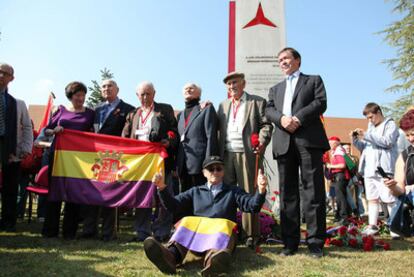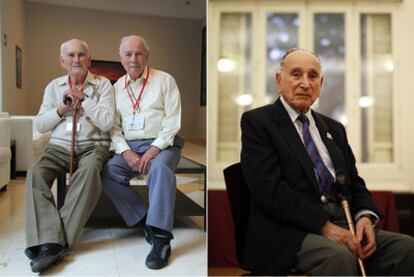"You are the history, you are the legend"
On the 75th anniversary of the creation of the International Brigades, four surviving members recall their experiences of fighting in the Spanish Civil War
They were less than 20 years old when they left their countries and families to come and gamble their lives in Spain in defense of a government that was not theirs but whose ideals they shared: the Republic. They came to number 35,000 - among them writers such as George Orwell and politicians including Willy Brandt - arrived from 55 countries. Around 9,000 of them died or were taken prisoner. Today, few are still alive, but four of them have come to Spain to participate in the tribute organized by the Friends' Association of the International Brigades to mark the 75th anniversary of their creation by decree of then-Republican Prime Minister Francisco Largo Caballero.
"I was 17 and I thought I had to do something," says Briton David Lomon, who is a month away from celebrating his 93rd birthday. "I didn't want to just stand there while I saw fascism winning in Spain. The day I turned 18, I went. I didn't say anything to my mother because she would never have let me go, and I felt a lot of remorse for what she suffered, but afterwards she said she was very proud and I turned into her favorite. And I had eight brothers and sisters."
"What I am most proud of in my life is having fought for the Republic"
Lomon arrived thinking they would win. "We were the good guys," he says with a smile. It didn't take him long to realize it wasn't going to be so easy. "When I arrived in Spain I wasn't aware of the magnitude of the support that the Italians and Germans were giving Franco. I wasn't expecting that. Neither was I expecting that we would be so alone. Nobody was supporting the Republicans, only volunteers."
But it was during the brief training he did before heading to the front that Lomon really realized how weak his side was. "It was terrible. For weapons we had the leftovers from the Russians in the First World War. They kept jamming. They were very delicate. Neither the heat nor the cold suited them."
The best part of his stay in Spain was meeting the Republicans, he says. "It was fascinating for me to see people so poor and at the same time so proud." He had a Spanish girlfriend during the war, but it didn't last very long. "I remember one day I invited her to the cinema, and she turned up there with her whole family!" he says, roaring with laughter.
Lomon didn't end up participating in big battles - "just skirmishes" - but he did come close to death. A bomb knocked him unconscious for he doesn't know how long. When he woke up he was in a prisoner camp. "The Italians had captured me. We were almost all foreigners. In fact, while I was there the Gestapo came to see what Germans were supporting the Spanish. It was a horrific thing. When they put you in a place like that it is as if they had removed you from the world. I was freed in a prisoner exchange: they exchanged me for some Italian."
During the interview, Lomon proudly shows the Spanish passport he obtained thanks to the Law of Historical Memory, which awarded Spanish nationality to International Brigade members. Losing the war in Spain was "a very tough blow," but he says it served to inspire him to join the army upon his return to the UK, "to later fight against Hitler. That war we did win."
Estonian Erik Ellmann, 92, looked uncomfortable with the applause he received at the tribute. "I don't deserve it," he says. "I was a kid. I was 19 and I only took part in the end of the war. I did the best I could with the weapon they gave me - one from 1896."
From a poor family, Ellmann remembers that his country's government "made a law that punished those who helped the Spanish with 10 years of forced labor." He decided to risk it. "My ideals and those of my parents were the same as those of the Republic."
He was in the Battle of the Ebro and holds on to an enormous regret. "We were a scouting party and we had to warn if we saw the Francoists advance. We went to rest and they advanced. We don't know what happened to those coming behind us."
Brothers José Eduardo and Vicente Almudéver Mateu, 92 and 94 respectively, born in France of Spanish parents also haven't forgotten. "We went to the front without bullets!" says José. "Five kilometers away there was a PCE [Spanish Communist Party] column and they gave me five. Later the colonel gave us another five. Ten bullets for a war!" On May 25 1938 he was wounded in combat. "Upon my release they sent me home, but I came back. I ended up at the port in Alicante. It was terrible what happened there."
In that port in April 1939, 20,000 Republicans, the war already lost, awaited the arrival of some foreign boats in which they were to flee Franco. They never arrived. When, upon the entry of Italian troops, it became clear there was no way out, many opted for suicide. "I remember a pregnant woman, lain on the floor, and a man who was shaving with a knife beside her. I heard a terrible cry. When I looked back, the man had slit his throat and the woman had seen it all," says José, who ended up in Los Almendros concentration camp after having thrown his Brigade membership card into the sea.
Vicente was at the front in Guadalajara and at the Battle of the Jarama. He was also in Madrid. "Despite having lost, what I am most proud of in my life is having fought for the Republic in the Civil War," he says. Like his comrades, he also later fought in World War II.
José Carrillo, son of ex-PCE leader Santiago Carrillo, and current rector of Madrid Complutense University, where a monument to the Brigades has just been put up, says: "I don't recall an example of international solidarity to compare with the participation of 35,000 brigade members who came to Spain to defend the legality of the Republic, and that of Spaniards themselves, who tried to return the favor in World War II by joining the resistance against the Nazis. They are an example, not an invention of Stalin, as one nostalgic person who filed a complaint against the monument and accused me of meddling in politics claimed. The university campus bore witness. Many brigade members fought here and bullet holes can still be seen in the oldest buildings."
Despite the complaint, the monument was inaugurated last Saturday. it consists of two big steel plaques on which is inscribed a line of famed Republican leader Dolores Ibárruri, "La Pasionaria": "You are the history, you are the legend. You are the heroic army of solidarity and of the universality of democracy."


Tu suscripción se está usando en otro dispositivo
¿Quieres añadir otro usuario a tu suscripción?
Si continúas leyendo en este dispositivo, no se podrá leer en el otro.
FlechaTu suscripción se está usando en otro dispositivo y solo puedes acceder a EL PAÍS desde un dispositivo a la vez.
Si quieres compartir tu cuenta, cambia tu suscripción a la modalidad Premium, así podrás añadir otro usuario. Cada uno accederá con su propia cuenta de email, lo que os permitirá personalizar vuestra experiencia en EL PAÍS.
¿Tienes una suscripción de empresa? Accede aquí para contratar más cuentas.
En el caso de no saber quién está usando tu cuenta, te recomendamos cambiar tu contraseña aquí.
Si decides continuar compartiendo tu cuenta, este mensaje se mostrará en tu dispositivo y en el de la otra persona que está usando tu cuenta de forma indefinida, afectando a tu experiencia de lectura. Puedes consultar aquí los términos y condiciones de la suscripción digital.








































